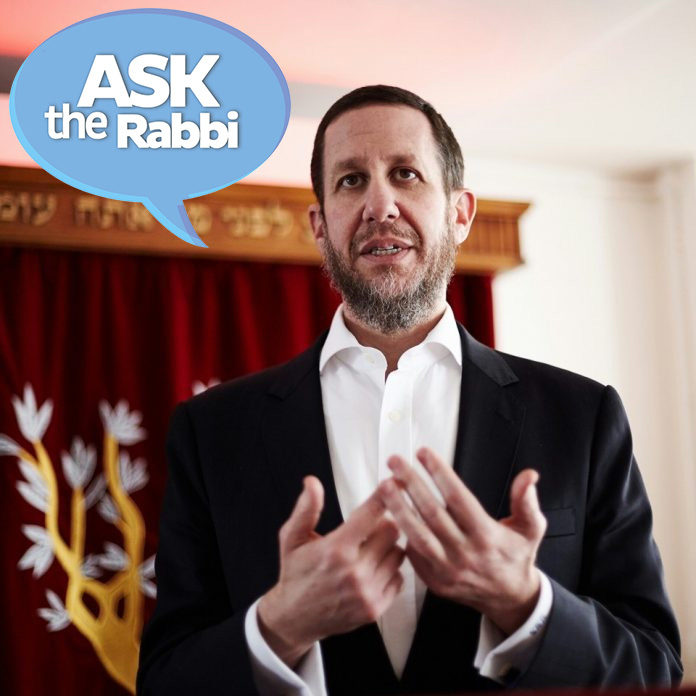
LOOKING FOR MRS. RIGHT
Dear Rabbi
I am 35 years old and can’t get married. Can you help me? It’s like I have no luck!
Arthur
Dear Arthur
I’m sorry you’re struggling. But here’s a little piece of advice: With an attitude like ‘I have no luck,’ you’re never going to get anywhere. Every time you go out you’ll be immediately assuming the worst and will panic at every blip. Maintain a positive attitude and keep an open mind and I assure you, you will find the right one that much quicker. Don’t forget to send me an invitation.
WHAT’S IN A JEWISH NAME
Dear Rabbi
Is Lenderman a Jewish name? Me and a friend keep arguing about its origins. It is known to come from the Lower Rhine since ancient times. But he says that it is Jewish and that “Lender” “Man” likely meant they were some kind of lenders or bankers. But when I ask other people with the same last name they reply it is German and has always been. My friend looked it up on the internet and sure enough found some people with the name who were Jewish. And now I am all confused. I even looked on HouseofNames.com and they even said it is German. My friend’s name is Friedman and he said it is Jewish/German and it even say it is a Jewish name, but Lenderman says German. What do you think?
Lenderman
Dear Lenderman
Arguing with your friend – searching the internet – what do I think? I think you have too much time on your hands. I really hope you don’t lose too much sleep over this (though I nearly dozed half way through the question). Hey, you’re Jewish and the name is yours – so consider it a Jewish name henceforth. And spend your time on more productive things.
IS STONING BARBARIC
Dear Rabbi
I understand that the biblical punishment for adultery was death by stoning, even if the adulterer never killed anyone. Although I do not condone adultery, I think that this punishment is extreme, because an adulterer is not necessarily a murderer and if he has been executed, he cannot repent.
Daisy
Dear Daisy
Firstly, this was something that applied only in ancient times. Secondly, the criteria required was very specific. There needed to be a pre-warning and witnesses to the actual offence caused. As you will appreciate that in itself would be rare to come by. Thirdly, as to your distinction between murder and other offences, there are more ways than the obvious to commit murder. You can embarrass someone to the point where you kill their feelings hence our Sages consider it tantamount to murder. You
can gossip about someone such that you kill their image and this too is tantamount to murder. You can also kill a relationship and destroy a person’s self esteem. I’ve seen the faces of inconsolable spouses who were cheated on. In G-d’s world, when committing such a blatant violation, per the above criteria (i.e. disregarding an advance warning and indifferent to eye witnesses) then such a breach of trust is irredeemable other than through capital punishment; even if our politically correct world of laissez faire doesn’t buy in.
A COHEN CONUNDRUM
Dear Rabbi
This is the situation: A girl marries in a civil ceremony, then gets divorced (not a get) and now intends to marry again to somebody else in a Jewish ceremony. The new partner’s father is a Cohen. However the parents of the new partner married in a reform ceremony. What is the Halacha for this situation? Is she considered a divorcee such that she cannot marry a Cohen? Does the first civil marriage cancel that? Does the parent’s reform wedding ceremony have any impact on this situation? Will the couple still be able to have a traditional orthodox wedding?
Michal
Dear Michal
If the father of the new partner is a Cohen then obviously so is the son, and as the wife to be was in a previous relationship, regardless of the fact that it was civil, that would render them unfit for marriage. They will therefore be unable to have a traditional orthodox wedding. However, it is worthwhile determining more about the parents’ original reform wedding. It remains a very real possibility that insofar as it took place outside of an Orthodox framework that perhaps the mother was an ‘unsuitable’ spouse for a Cohen, hence they went that route. That then would mean that the son (the now potential new partner) has lost his formal status of priesthood and can therefore marry the woman in question.
BUY NOW, BURY LATER
Dear Rabbi
A family friend is concerned about what will happen with her body when she passes away. She is not a member of a Shul and therefore has not paid any Burial rights. She has no money and neither do her children. In this instance, would she still be able to be buried in a Jewish cemetery? If she can be, who pays for it?
Richard
Dear Richard
That would render her a met mitzvah where it would be incumbent upon the community to ensure a proper Jewish burial. But as you are aware of the concern now, something ought to be done – perhaps a discussion with a burial society – before any potential problems might emerge later.
THE “HEBREW BIBLE”
Dear Rabbi I am attempting to write an essay on: “The covenantal relationship between G-d and Israel is a central feature in the Hebrew Bible.” I was wondering if you can offer some insight. Can you recommend any reading?
Suzi
Dear Suzi
I would recommend reading – the Bible! You’ll find that it’s all about G-d choosing Israel as His ‘first born son,’ and Israel in turn believing very much in a personal G-d who is every bit a part of each of their individual lives. PS: I’m never sure what’s meant by the “Hebrew Bible.” Is there any other?









